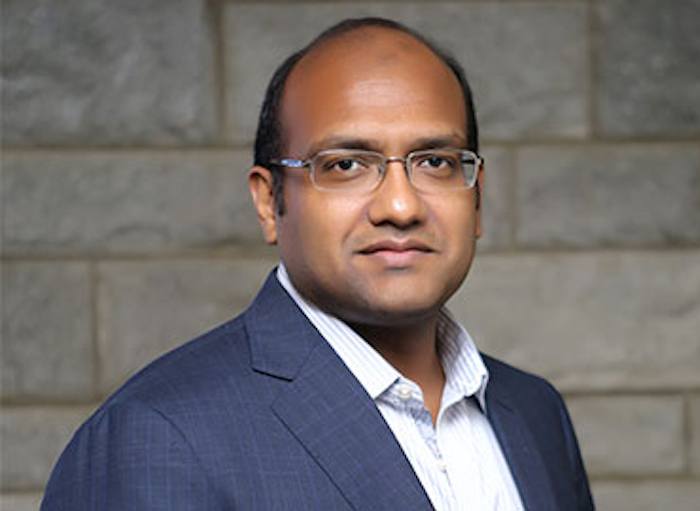
Atif Azim. Photo credit: Publicity.
Atif Azim is an accidental entrepreneur. After his undergraduate at Imperial College, London, he was accepted for a masters in computer science at Stanford, which he gleefully accepted.
The plan was to finish his degree, find a well-paying, stable job and start paying off his humongous student debts. But what Atif – born in the United Arab Emirates to Pakistani parents – saw in San Francisco completely changed his outlook.
“The founders of Google were just six years our senior. Everyone around me was obsessed with building products and changing the world. The energy was contagious,” recalls Atif.
“And why not? One should always think big.”
After graduating in 1999, Atif decided to enter the field of technology consulting “just to get my feet wet,” and glean an idea of the emerging tech landscape in Silicon Valley. Approximately a year in, he quit to join Brience, a fast-growing startup that helped large enterprises customize mobile experiences for consumers.
The dotcom crash hit badly.
Brience – which had raised US$200 million – was considered a hot prospect for an IPO. It had already started preparing for this inevitability by filing the requisite paperwork and conducting due diligence. But the dotcom crash hit badly and those plans were shelved.
“Some people may look at that and call it a failure, but I certainly didn’t. We learned so much from it,” he says.
Atif quit shortly after, along with a couple of other people, and started wireless security firm Perfigo. His first client? Stanford.
The initial problem it solved was to clear campus networks of all the malware that students would bring in on infected laptops and PCs after summer break. System administrators for universities would have to deploy tons of resources to remove all the bugs and viruses. It was a painful and time-consuming process.
Atif and team understood they were dealing with compliance issues. All they had to do to ensure a stable network was to check whether a user had the right policies and software installed before logging on.
Other universities across the west coast started noticing Perfigo’s work and signed up. With more paying customers on board, Atif’s company began to grow fast, eventually becoming a policy compliance firm checking for things like HIPAA compliance, and financial compliance, among others.
In 2004, network security leviathan Cisco acquired Perfigo for a cool US$74 million. At the time it had 31 employees and counted Greylock Partners as one of its investors.
Atif stayed on at Cisco, based out of the San Francisco office for another three years. By 2007 he was married and had kids – and was itching for a change in scenery. That’s when he decided to move to Pakistan, even though he’d never lived in his parents’ homeland before.
“I went abroad for three reasons: to obtain a degree, get some work experience, and earn money. I felt I had achieved all three to a certain extent,” he says. “Plus my kids were young and I wanted to be closer to my extended family.”

Photo credit: jirsak / 123RF.
Working remotely
Atif’s love affair with Cisco didn’t come to an end just yet. He was transferred to its Pakistan office, helping the tech titan sell products across the Middle East, India, Australia, and Japan. It was a cushy job that paid well.
But something was amiss.
“Life was getting too comfortable and I wasn’t creating enough local impact. Furthermore, I worked late nights and it was affecting my social life. I love Cisco but it’s hard to push them to do new things. I wanted to be back in the thrill of a startup,” he says.
It was around the same time that ride-hailing startup Careem, now valued at over a billion dollars and present in 50 cities, was beginning to find its feet. Atif knew Mudassir Sheikha, Careem’s CEO, from his earlier work at Brience and the duo were eager to work together.
VentureDive was born in 2011 after Atif quit Cisco to go back to building globally scalable products. The startup took a small equity stake in Careem in exchange for building its entire tech stack – meaning the app, website, and other digital platforms.
Careem acquired the team in a 2016 deal.
It turned out to be a prescient move for the former Cisco executive. Even a five percent stake in Careem – at a billion dollar valuation – is worth US$50 million today.
“It started in a small conference room with about four of us. The initial goal was MVP in six weeks. We had a crack team of developers. We did road testing, made sure the apps are working, and distances are calculating correctly. The thrill was definitely back,” he laughs.
Careem’s gone from strength to strength since launch in 2011, which wouldn’t have been possible without the support of Atif’s VentureDive providing technical support at every step of the journey. SimilarWeb says Careem’s app – which has approximately 20 million downloads – is more popular than Uber in the Middle East and North Africa region. That’s no small feat.
“You can find lots of people who can code. But having a mindset to build products that are globally scalable is a different ballgame,” explains Atif.
“Rollouts have to be live, there cannot be any downtime. To manage these things at scale we have an internal philosophy of building for 10 times anticipated traffic but planning for 100 times. The system architecture we build supports this.”
Careem’s partnership with VentureDive continued until July 2016, after which it simply acquired the team working on its app. Atif says one of the reasons behind the deal was to give engineers more ownership of the product – now they were entitled to things like equity and larger bonuses.
It could also have been to fulfill corporate governance requirements. A ride-hailing unicorn can’t simply outsource its tech indefinitely. A few months later, Rakuten led a US$350 million funding round in Careem.
But Atif is quick to point out that VentureDive isn’t an “outsourcing company.” Operating on a partnership model, the team won’t simply accept any contracts that come its way. Rather, it’ll pick and choose the clients very carefully.
“We try to be the technical partners and the thought partners. To build global products, you either have your own feet on the street or you team up with emerging companies you feel will make it big,” he explains.
He points to IslamicFinder, one of the largest Muslim communities on the web, as an example. The founders are based out of Saudi Arabia but have relied on Atif’s team to build the apps and sites that are used by millions of people today. Everything from the design philosophy to product updates is handled by VentureDive.

Photo credit: Publicity.
What’s the secret?
Some would say Atif’s a successful entrepreneur. After all, he’s built and sold companies, earned millions of dollars, and has equity stakes in several others on the verge of making it big. And he’s not sitting back and resting on his laurels – there’s an urge to continue to seek out interesting opportunities and grow the team.
How did he do it?
“It’s important to be bold in your ambitions,” he affirms. “Make sure you invest in people, the right people. Invest in processes, otherwise you can’t scale. It’s also necessary to empower your team and give them the ownership and confidence to do what they want to do.”
But that’s easier said than done. Hiring is an art, not a science. So he had to circumvent this problem.
“My philosophy is not to hire based on intrinsics. Tech skills come and go. We want to hire people based on extrinsic factors. What’s their attitude? How sharp and eager are they? Do they just want to be an employee or are they willing to take ownership of the company? If you hire based on these factors, then nine times out of ten you will hire the right person,” he explains.
“If you’ve gotten a person on board, and you’ve done your research before making them an offer, then there’s a lot of responsibility on the organization to make sure they’re given the right tools and platform to succeed,” adds Atif.
At the same time, he emphasizes the growth of a coherent and vibrant team culture. The underlying premise in VentureDive is to be bold and not shy away from failure. Atif says he constantly pushes his team to get out of their comfort zones, keep learning and trying new things, but not be deterred if things don’t always go to plan.
“As a management team we also want to inspire those around us. Be bold and inspirational but always maintain respect, diversity, and integrity. We want to be proud of what we do and why we do it. A culture of excellence is crucial,” he says.
It’s a strategy that’s served the bespectacled entrepreneur well. He now has a team of 150 people working on mobile marketplaces, education tech, and marketing automation.
Atif’s also building localized products to cater to Pakistan’s burgeoning startup ecosystem. Currently his team’s dabbling in fintech – hoping to launch a microlending platform in the coming months. He’s also ploughing in hard cash where he sees opportunity – his most recent investments were in an educational tech startup in Saudi Arabia as well as mobile gaming company Taplando.
The founder’s work ethic and drive has earned him the respect of his peers.
“Atif is a world class professional and a huge source of learning and inspiration,” says Careem CEO Mudassir.
This post Cisco bought his first company for $74m. His second might be worth more appeared first on Tech in Asia.